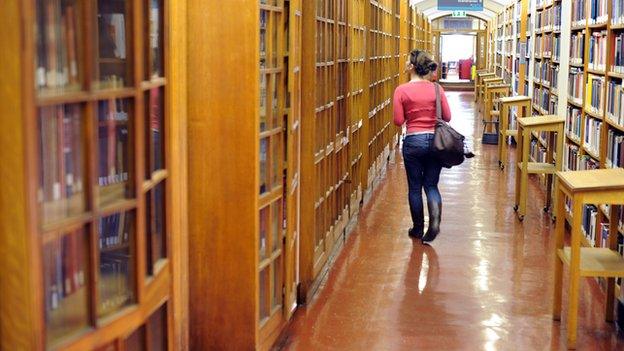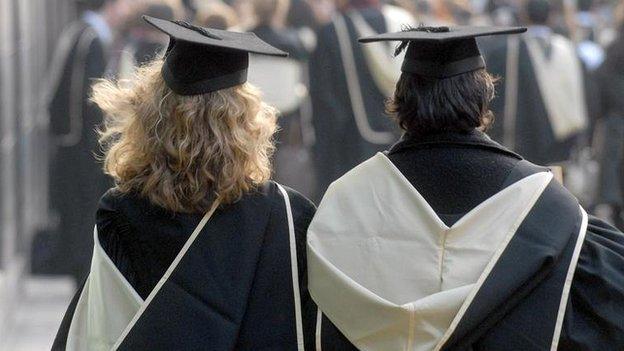Four in 10 students say university not good value - survey
- Published
The increase in tuitions fees has sharpened students' awareness of what they get from their courses, as Robert Piggott reports
Four in 10 of the first students to pay higher fees do not believe their courses have been good value for money, a survey for BBC Radio 5 live suggests.
Just over half say their university course has been good value and about 8% are undecided.
The survey of 1,004 final-year students also shows 46% would do the same course again.
Universities UK said the last national student survey found 86% of students were satisfied with their course.
The survey, carried out by ComRes from 1-7 May, focused on undergraduates in their final year of degree courses in 2015.
These students were the first to pay higher fees of up to £9,000 per year, after the price of university tuition trebled in 2012.
Many commentators predicted there would be a fall in student numbers but this did not happen.

Analysis
When tuition fees were trebled to £9,000 in 2012, the fundamental relationship between the student and their university changed.
As central university grants were drastically cut by government, the student became almost fully responsible for the costs of their higher education.
Despite mass protest on the streets of London and other cities and an initial dip in applications, the number of students applying for degree courses has recovered to pre-higher-fee levels.
And hundreds of thousands of students are still willing to take the gamble on a better future.
However, with the change, expectations of what courses would be like may have been raised. And yet average teaching time barely nudges 12 hours a week.
In arts courses, teaching time can be as little as eight hours a week, as there is much more emphasis on independent study.
But science courses, where students expressed a greater degree of satisfaction, tend to have more teaching time as well as access to laboratories and specialist equipment.
Although many of the final-year students in this survey may be feeling disgruntled, it will not be until they start earning and taking their first steps on their chosen careers that they will really know whether their investment has paid off.

The survey found there were differences of opinion between students doing different types of courses.
Two-thirds of those studying science, technology, maths and engineering - subjects that require a lot of practical teaching and staff time - said their courses had been good value.
And 44% of humanities and social science students, which tend to receive less direct teaching time, said they felt their courses represented good value.
Earnings shift
Elsewhere, one in eight students said they would still go to university if they had to make the decision again, but would study a different course - according to the survey.
Just 3% said they would not go at all.
Some 58% felt their courses had left them at least somewhat prepared for the future.
Nick Hillman, director of the Higher Education Policy Institute, told 5 live Breakfast that students paying £9,000 had a different attitude from those who had paid £3,000 a year and those whose education had been free.
He said that universities "don't have much more money", because they now receive less from the government, but "students are more demanding".
"What I would like to see is universities telling their students exactly where their money is going," he added.
Mr Hillman also noted that as fees went up, students were tending to choose subjects "more obviously linked to jobs".

Those graduating this year were the first to pay higher fees of up to £9,000 a year
Nicola Dandridge, chief executive of Universities UK, said there was no evidence to suggest that the 2012 student funding reforms had deterred students from applying to university, and application rates were high.
She said: "The last national student survey reported that 86% of students were satisfied overall with their course. It shows that universities across the UK are responding to student feedback and working hard to improve the academic experience.
"The shift in England from public funding to increased fees means that students are understandably, and rightly, demanding more from their university courses. Universities are responding to this and are also improving the amount of information to students about courses to ensure that their experience matches their expectations.
"Degree holders also continue to earn considerably more than non-graduates over a working lifetime and employers are predicting a double-digit rise in graduate vacancies this year."
- Published4 June 2015

- Published3 July 2014
